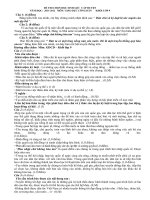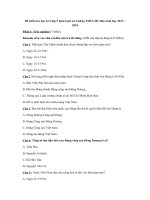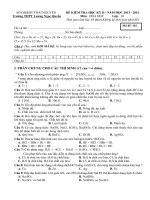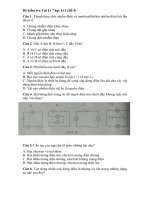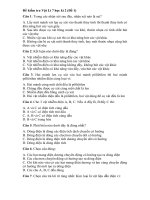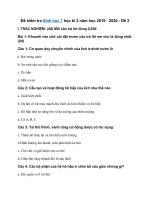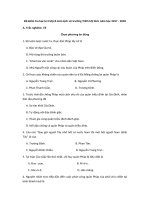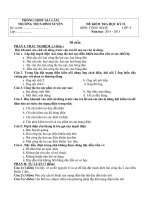- Trang chủ >>
- THPT Quốc Gia >>
- Lịch sử
Tải Đề thi chọn học sinh giỏi lớp 8 môn tiếng Anh có đáp án - Ôn thi học kì 2 lớp 8 môn tiếng Anh
Bạn đang xem bản rút gọn của tài liệu. Xem và tải ngay bản đầy đủ của tài liệu tại đây (92.98 KB, 4 trang )
<span class='text_page_counter'>(1)</span><div class='page_container' data-page=1>
<b>Full name: ...</b>
<b>Class: ...</b>
<b>ENGLISH LANGUAGE TEST</b>
<b>Time: 45 minutes</b>
<b>I. LISTENING</b>
<b>1. Listen to the announcement. Fill each of the gaps with the ONE word and/ or a</b>
<b>number. You will listen TWICE.</b>
<b>Source of noise</b> <b>Organization</b> <b>Phone number</b>
Commercial activities
Transportation activities
Public events
Military vessels
Residential areas
local council
2. ________ control
national entertainment
navy department
5. ________ police
1. ________
131454
3. ________
4. ________
133666
<b>2. Listen to Annie talking about the Internet. Decide if the statements are true (T) or</b>
<b>false (F). Circle T or F. You will listen TWICE.</b>
1. Annie thinks the Internet is the greatest invention.
2. Annie does her homework on the Internet.
3. Annie loves emails.
4. Annie spends little time on the Internet.
5. Annie puts a lot of her personal information on Facebook.
<b>II. READING</b>
<b>1. Read the passage and answer the questions. Circle A, B, or C.</b>
The Moon is approximately 384,400 kilometers from the Earth. Its diameter is 3,479
kilometers, about 1/4 the diameter of Earth. The average temperature on the surface of the
Moon during the day is 107°C, hot enough to boil water on Earth. During the night, the
average temperature drops to −153°C.
Because of its smaller size and mass, the gravity of the Moon is about 1/6 the gravity on
the Earth. That means that a person who weighs 180 pounds on Earth would only weigh
30 pounds if measured on the Moon.
The force of gravity from the Moon affects Earth. Its gravity reaches Earth and pulls the
oceans toward the Moon, causing the tides. The gravity from the Sun also affects the tides.
The highest tides will always occur when the Moon and Sun are aligned. That is when
there is a New Moon or a Full Moon.
1. What is the first paragraph mainly about?
A. A comparison between the Moon and Earth
B. Physical characteristics of the Moon
C. The effect of the Moon on Earth
2. The word “its” in paragraph 2 refers to which of the following?
A. the Moon’s
B. Earth’s
C. gravity’s
</div>
<span class='text_page_counter'>(2)</span><div class='page_container' data-page=2>
C. The Earth weighs six times as much as the Moon.
4. What can we learn about the tides?
A. They happen twice a month at New Moon and Full Moon.
B. The Sun causes higher tides on Earth than the Moon does.
C. They are caused by both the Sun and the Moon.
5. The word “aligned” is closest in meaning to which of the following?
A. combined together
B. arranged in a line
C. affected by the other
<b>2. Read the passage about computers. Decide if the statements are true (T) or false</b>
<b>(F). Circle T or F.</b>
<b>Do you own a PDA – Personal Digital Assistant? Have you got a personal computer?</b>
<b>Have you ever used a laptop? The answer can be “Yes”. But do you know that the</b>
<b>first computer was made about 70 years ago? It was large enough to take up a living</b>
<b>room. It was named ENIAC – Electronic Numerical Integrator and Calculator.</b>
<b>Thanks to the development of technology, computers become smaller and smaller.</b>
<b>The first personal computer was actually introduced in the 1970s by MITS, Apple</b>
<b>Computer and IBM. They didn’t look exactly like now but they were surely</b>
<b>revolutionary</b> <b>at</b> <b>the</b> <b>time.</b>
<b>Scientists are finding ways to make computers as smaller and slimmer as possible.</b>
<b>Some of the today computers are small enough to carry out in pockets. But</b>
<b>technology doesn’t stop there. They will continue to bring out smaller computers.</b>
<b>Who knows? Maybe one day we will not need the big desktops or laptops. We may</b>
<b>need a computer chip that is as small as a fingernail.</b>
1. The first computer was made 70 years ago.
2. The ENIAC was small enough to carry around.
3. MITS, Apple Computer and IBM were the first to introduce personal computers.
4. Today computers are not as small and slim as the previous ones.
5. Fingernail size computer chip will soon be a new revolution.
<b>III. WRITING</b>
<b>1. Complete each of the following sentences using the cues given. You can change the</b>
<b>cues and use other words in addition to the cues to complete the sentences.</b>
<b>Here</b> <b>is</b> <b>an</b> <b>example.</b>
0. Ngoc/ usually/ play/ badminton/ Sunday.
Answer: 0. <i>Ngoc usually plays badminton on Sundays.</i>
1. Noise pollution/ big cities/ lead/ hearing/ problems.
________________________________________
2. Lots/ aquatic animals/ die/ because/ oil spills.
________________________________________
3. If/ you/ president/ country/ what/ you/ do/ protect/ environment?
________________________________________
</div>
<span class='text_page_counter'>(3)</span><div class='page_container' data-page=3>
5. This boy/ suffer/ birth/ defects/ because/ parents/ expose/radioactive/ pollution.
________________________________________
<b>2. Write an email (90-110 words) to your pen friend telling him about a natural</b>
<b>disaster that you have experienced, seen or been told about.</b>
<b>Use the following questions as cues:</b>
- What is the disaster?
- When did it occur?
- Where did it occur?
- What were its consequences?
- How did you feel about it?
Dear Mary,
<b>Đáp án </b>
<b>I. LISTENING</b>
<b>1. Listen to the announcement. Fill each of the gaps with the ONE word and/or a</b>
<b>number. You will listen TWICE.</b>
<b>Key:</b>
1. 130243
2. traffic
3. 123955
4. 132749
5. assistance
<b>2. Listen to Annie talking about the Internet. Decide if the statements are true (T) or</b>
<b>false (F). Circle T or F. You will listen TWICE.</b>
1. T 2. F 3. T 4. F 5. F
<b>II. READING</b>
<b>1. Read the passage and answer the questions. Circle A, B, or C.</b>
1. B 2. A 3. B 4. C <sub>5. B</sub>
<b>2. Read the passage about computers. Decide if the statements are true (T) or false</b>
<b>(F). Circle T or F.</b>
1. T 2. F 3. T 4. F 5. T
<b>III. WRITING</b>
<b>1. Complete each of the following sentences using the cues given. You can change the</b>
<b>cues and use other words in addition to the cues to complete the sentences.</b>
</div>
<span class='text_page_counter'>(4)</span><div class='page_container' data-page=4>
3. If you were the president of the country, what would you do to protect the environment?
4. One way to save the environment is using (to use) renewable energy sources.
5. This boy suffers (is suffering/ has suffered) from birth defects because his parents were
exposed to radioactive pollution.
<b>2. Write an email (90-110 words) to your pen friend telling him about a natural</b>
<b>disaster that you have experienced, seen or been told about.</b>
Dear Mary,
How are you? I must write to tell you about the natural disaster I saw on TV this morning.
It was a huge tsunami in Japan two days ago. At first, there was a very strong earthquake,
and then the tsunami swept through the coastal areas of northern Japan.
It was so devastating. What used to be busy and lively cities now has become a vast area
of debris. Houses were totally destroyed, and pieces of furniture and means of transport
were scattered everywhere. Luckily, thanks to early warning, there was no human loss. I
felt terrible .I intend to donate some of my pocket money to help the Japanese
people.Would you like to join me?
Love
</div>
<!--links-->
Tài liệu ĐỀ THI HỌC SINH GIỎI TOAN 9 NAM 2009-2010(CO DAP AN)
- 3
- 2
- 23
